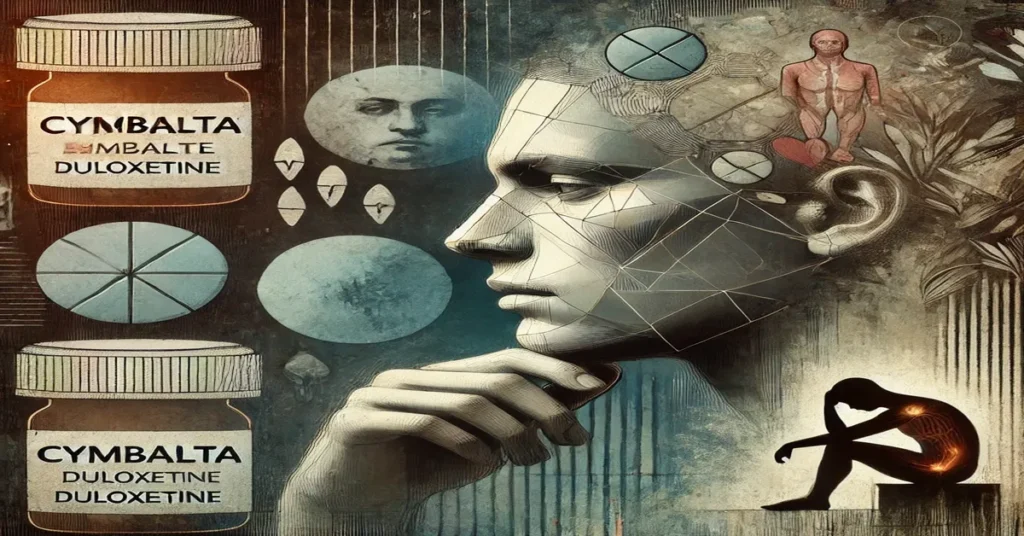Cymbalta (Cymbalta Ruined My Life), also known by its generic name duloxetine, is a prescription medication widely used to treat conditions like depression, anxiety, chronic pain, and fibromyalgia. Approved by the FDA in 2004, it has been a common choice for millions of people struggling with mental health issues and chronic pain disorders. However, while Cymbalta has provided relief and hope to many, it has also been associated with severe and sometimes life-altering side effects for others. In this article, we explore the complexities of Cymbalta, including how it works, potential benefits, risks, and personal experiences that underscore the potential for negative impacts. We will also delve into how individuals can cope with Cymbalta-related challenges and provide some answers to frequently asked questions.
Chapter 1: What is Cymbalta?
How Cymbalta Works
Cymbalta (Cymbalta Ruined My Life) (duloxetine) is a type of medication called a serotonin-norepinephrine reuptake inhibitor (SNRI). SNRIs work by increasing the levels of serotonin and norepinephrine in the brain. These neurotransmitters play key roles in regulating mood, emotions, and pain responses. By enhancing their activity, Cymbalta can help alleviate symptoms of depression and anxiety while also providing relief for pain disorders like fibromyalgia and chronic musculoskeletal pain.
Conditions Treated by Cymbalta
The main conditions treated by Cymbalta (Cymbalta Ruined My Life) include:
- Major Depressive Disorder (MDD)
- Generalized Anxiety Disorder (GAD)
- Diabetic Peripheral Neuropathy
- Fibromyalgia
- Chronic Musculoskeletal Pain
FDA Approval and Popularity
Cymbalta’s (Cymbalta Ruined My Life) wide-ranging efficacy in mental health and pain management has made it popular among both patients and healthcare providers. However, its popularity has also highlighted the risks associated with its use, with many patients reporting adverse experiences that have profoundly impacted their lives.
Chapter 2: Potential Benefits of Cymbalta
Relief from Depression and Anxiety
Cymbalta (Cymbalta Ruined My Life) has shown promise in treating depression and anxiety symptoms in patients who haven’t responded to other medications. For those dealing with MDD or GAD, Cymbalta can alleviate symptoms, improve mood, and enhance the quality of life.
Pain Management
Cymbalta (Cymbalta Ruined My Life) is often prescribed to help manage pain associated with fibromyalgia and diabetic neuropathy. Studies have shown that it can significantly reduce pain intensity and improve functionality in patients with these chronic pain conditions.
Improvement in Daily Life Activities
For many, Cymbalta (Cymbalta Ruined My Life) provides relief that allows them to regain independence and engage more actively in daily life. From returning to work to spending more quality time with loved ones, Cymbalta has enabled many people to rebuild their lives.
Chapter 3: The Risks and Side Effects of Cymbalta
Despite its potential benefits, Cymbalta (Cymbalta Ruined My Life) comes with a host of possible side effects. These side effects can range from mild discomfort to severe, life-altering consequences.
Common Side Effects
Some of the common side effects associated with Cymbalta (Cymbalta Ruined My Life) include:
- Nausea
- Dry mouth
- Fatigue
- Dizziness
- Insomnia
- Constipation
While these side effects are common and generally mild, they can persist or worsen for some users, leading to long-term issues.
Severe Side Effects and Long-Term Risks
The more serious side effects of Cymbalta (Cymbalta Ruined My Life) include:
- Suicidal Thoughts and Behaviors: Cymbalta (Cymbalta Ruined My Life) carries a boxed warning for the risk of suicidal thoughts and behaviors, particularly among younger users.
- Liver Damage: In rare cases, Cymbalta can cause severe liver damage, especially in those with a history of liver disease or alcohol use.
- Serotonin Syndrome: This potentially life-threatening condition occurs when there is an excess of serotonin in the brain. Symptoms include agitation, confusion, high blood pressure, and rapid heart rate.
- Withdrawal Symptoms: Cymbalta withdrawal, also known as “Cymbalta Discontinuation Syndrome,” is one of the most reported issues. Withdrawal symptoms can be so severe that users feel trapped by the medication.
Long-Term Impact on Mental Health and Emotional Well-being
Some people report experiencing “emotional blunting,” where they feel detached or emotionally numb after taking Cymbalta (Cymbalta Ruined My Life). Others report worsened mental health symptoms, including increased anxiety, paranoia, and depression.
Impact on Physical Health
For some individuals, Cymbalta (Cymbalta Ruined My Life) has been associated with physical health issues like sexual dysfunction, muscle weakness, and increased blood pressure. Long-term use has been linked to cases of weight gain, fatigue, and metabolic changes.
Chapter 4: Cymbalta Discontinuation Syndrome
One of the most distressing issues associated with Cymbalta (Cymbalta Ruined My Life) is discontinuation syndrome, a collection of withdrawal symptoms that can be both intense and prolonged. Many users report “brain zaps,” a sensation similar to electric shocks in the brain, as well as symptoms such as:
- Nausea and vomiting
- Dizziness
- Intense mood swings
- Nightmares and vivid dreams
- Flu-like symptoms
Challenges of Tapering Off
Some individuals find it nearly impossible to taper off Cymbalta (Cymbalta Ruined My Life) due to the severe withdrawal symptoms. Medical experts often recommend a gradual taper, but even with a slow reduction in dosage, many users continue to experience disruptive withdrawal symptoms for weeks or even months.
“Cymbalta Ruined My Life”: A Common Refrain
Many patients report that Cymbalta (Cymbalta Ruined My Life) caused their symptoms to worsen or led to entirely new health problems. Some describe their experience with Cymbalta as life-changing but in a negative way. Emotional detachment, loss of motivation, increased anxiety, and the inability to experience joy have been reported by those who feel Cymbalta disrupted their mental well-being.
Chapter 5: Coping with Cymbalta-Related Challenges
For those who experience adverse effects from Cymbalta (Cymbalta Ruined My Life), coping with the medication’s impact can be overwhelming. Below are some strategies that may help.
1. Seek Medical Guidance for Tapering
For individuals aiming to discontinue Cymbalta, working closely with a healthcare provider is essential. A personalized tapering plan can help mitigate withdrawal symptoms, though it may not eliminate them entirely.
2. Consider Therapy and Support Groups
Cognitive Behavioral Therapy (CBT) and other forms of counseling can help individuals process the emotional and psychological changes brought on by Cymbalta. Many people have found solace in support groups, where they can connect with others who have had similar experiences.
3. Holistic Health Approaches
Some individuals find relief through lifestyle changes and alternative treatments such as acupuncture, yoga, and meditation. These methods may provide comfort, especially for those dealing with physical symptoms like pain or fatigue.
4. Track Symptoms and Advocate for Adjustments
Keeping a journal to track symptoms can help individuals better understand how Cymbalta is impacting them. This information can be crucial when discussing concerns with a healthcare provider, as it provides concrete evidence of the drug’s effects.
5. Legal Recourse and Advocacy
There have been lawsuits involving Cymbalta, particularly related to its withdrawal symptoms. Patients who feel misinformed or misled by their healthcare providers or the drug manufacturer may explore legal options. Advocacy efforts aim to raise awareness and push for better patient information.
Chapter 6: Personal Stories and Testimonials
To understand the true impact of Cymbalta, it’s helpful to consider the personal stories of those who have faced challenges with the drug. Here are a few common themes from testimonials:
Emotional Numbness
Many report feeling emotionally “flat” or disconnected from loved ones, unable to experience joy or sadness. This emotional numbness can significantly affect personal relationships and overall quality of life.
Physical Dependence and Withdrawal
Numerous stories involve struggles with Cymbalta discontinuation, with some users unable to stop taking the medication due to debilitating withdrawal symptoms. This experience can make individuals feel as though they’re trapped by the medication.
Feeling Misinformed
Several people report feeling that they weren’t fully informed about Cymbalta’s risks, particularly the intensity of withdrawal symptoms. This lack of information has left many feeling frustrated, isolated, and unprepared.
Conclusion
Cymbalta has been a life-saving medication for many individuals, particularly those dealing with treatment-resistant depression and chronic pain. However, for others, the side effects, withdrawal symptoms, and emotional impacts have been overwhelming. The stories of those who feel their lives were negatively affected by Cymbalta underscore the importance of informed consent, thorough discussions with healthcare providers, and robust patient advocacy.
If you are considering Cymbalta or are currently taking it, be proactive in discussing any concerns with your healthcare provider. It’s essential to weigh the potential benefits and risks, monitor any side effects, and seek guidance if you experience withdrawal symptoms or other complications.
Frequently Asked Questions (FAQs)
1. What should I do if I experience severe side effects from Cymbalta?
If you experience severe side effects, such as suicidal thoughts, liver problems, or serotonin syndrome, seek medical attention immediately. Contact your healthcare provider to discuss alternative treatment options and strategies for managing side effects.
2. Can I stop taking Cymbalta abruptly?
No, stopping Cymbalta suddenly can lead to severe withdrawal symptoms, known as Cymbalta Discontinuation Syndrome. It is crucial to consult with your healthcare provider to create a gradual tapering plan if you decide to discontinue the medication.
3. Are there alternative medications to Cymbalta?
Yes, there are alternative medications, including other SNRIs, SSRIs, and different classes of antidepressants. Your healthcare provider can help determine the best alternative based on your symptoms, medical history, and response to treatment.
4. How can I manage Cymbalta withdrawal symptoms?
Managing withdrawal symptoms often involves a slow, gradual reduction in dosage. Some people also find relief through therapy, support groups, and holistic health approaches. It’s essential to work closely with a healthcare provider during the withdrawal process.
5. Is Cymbalta safe for long-term use?
While Cymbalta is considered safe for many individuals in long-term use, it carries risks of side effects and potential health issues over time. Regular check-ups with your healthcare provider are necessary to monitor for any adverse effects.
6. Can I sue for Cymbalta-related side effects?
In some cases, individuals who have experienced severe side effects or withdrawal symptoms have pursued legal action. Consulting with a legal expert can help you determine if you have grounds for a lawsuit, especially if you feel that you were inadequately informed about the medication’s risks.







